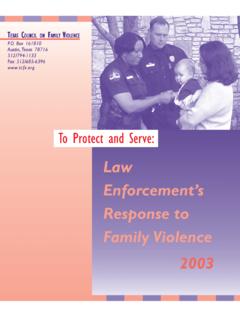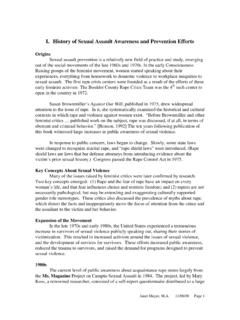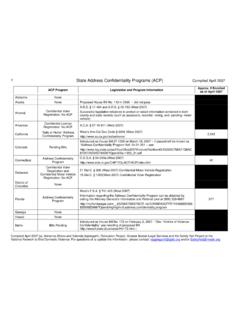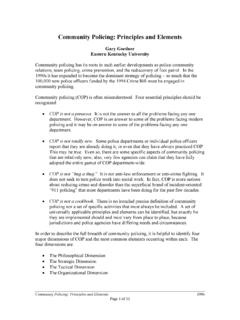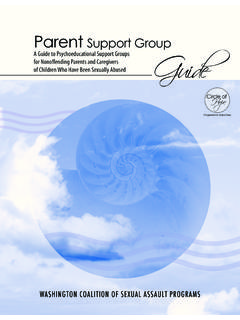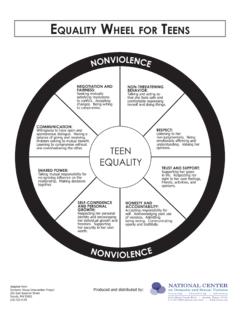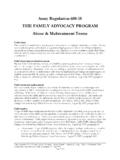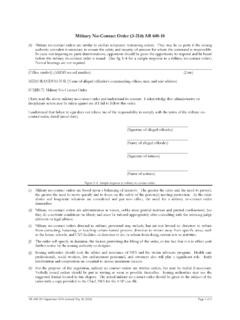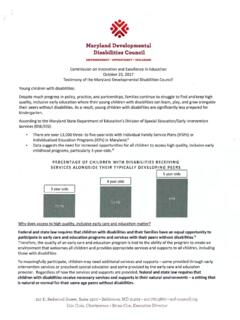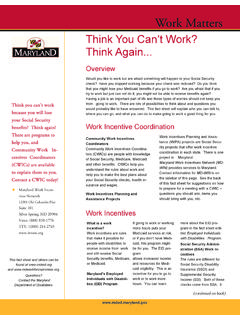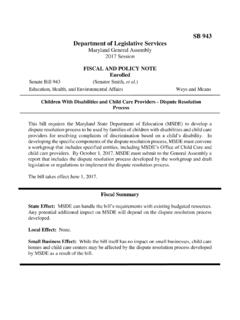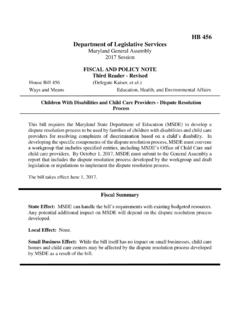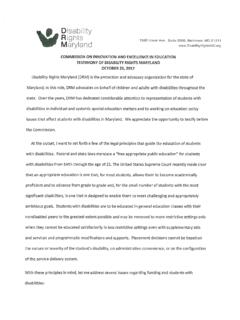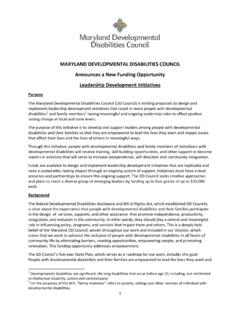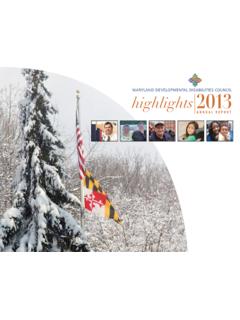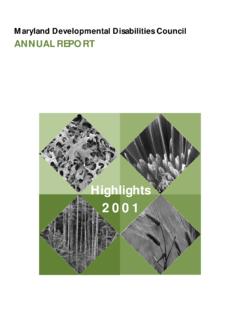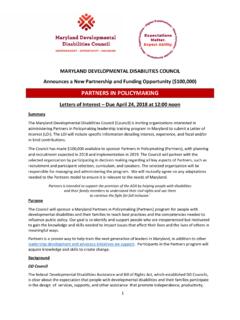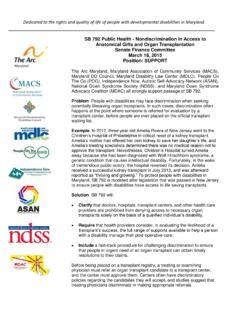Transcription of final
1 Safety Planning PERSONAL Awareness Choice Empowerment A Violence Prevention Program for Women Developed by The Arc of maryland in Partnership with The Arc of Southern maryland and The Arc of the United States Supported by a Grant from the Administration on developmental disabilities , Department of Health and Human Services Page 1. Page 2. Safety Planning PERSONAL Awareness Choice Empowerment A Violence Prevention Program for Women Developed by The Arc of maryland in Partnership with The Arc of Southern maryland and The Arc of the United States Written by The Arc of maryland 's Gender Violence Prevention Research and Development Team Catriona Johnson, Project Coordinator Vanessa Antrum, maryland developmental disabilities Administration Southern Regional Office Mary Atkins, The Arc of Southern maryland Sarah Basehart, The Arc of maryland Mary Ann Blotzer, LCSW-C, Counselor Gordon Bonham, PhD, Bonham Research Mary Ann Carmody, RN, Certified Sex Educator Judy Craft.
2 The Arc of Southern maryland Cheryl Downs, People on the Go of maryland Colleen Gauruder, MA, maryland developmental disabilities Administration Angela Harp, Self-Advocate Susan Holland, Prince George's County Commission on disabilities P. Sue Kullen, MS, Human Services Consulting Diane McComb, MS. Ed., maryland Association of Community Services for Persons with developmental disabilities Lori Powell, Living Free Campaign Laura White, maryland developmental disabilities council Original Artwork by Charles E. Harrington, III. Partial support for this project was provided by a Projects of National Significance grant from the Administration on developmental disabilities , Administration for Children and Families, Department of Health and Human Services.
3 The content of this book reflects the ideas and positions of the authors and does not necessarily reflect the ideas and positions of the Department of Health and Human Services;. therefore, no official endorsement should be inferred. Page 3. Acknowledgements I would like to thank the numerous individuals who played a role in the development of this curriculum: Cristy Marchand, Executive Director of The Arc of maryland for your willingness to forge new paths. The Gender Violence Prevention Research and Development Team for all of your time spent processing, creating, and revising. Mindy Morrell, former Executive Director of the maryland developmental disabilities council , for adding Laura to our team and then for allowing me to continue on the project after moving to the council .
4 Diane Coughlin and Nancy Kirchner for your support of self-advocacy efforts in maryland that form the foundation of all of our work. Harriet Yaffe, Mac Ramsey, Mary Funk, and Margie Diekmann for allowing us to bring Personal SPACE to your organizations and working with us to make each of our pilot programs so successful. Jackie Brooks for showing us just how supportive direct care staff can be. Charles Harrington for your willingness to step in at the last moment and add your creative flair. Sharon Davis and Leigh Ann Davis at The Arc of the United States for your careful review of the draft curriculum and your thoughtful comments. To the presenters at the Violence Against Women with developmental disabilities : Responding to the Crisis Conference Dick Sobsey, Julia Spann, Mary Ann Curry, Marc Dubin, Maria Hanson, Sharon Bickel, Colonel David Mitchell, Colonel Douglas Holland, Retired Detective Dan Cleavis, Officer Brian Waters, Karen Eggeling, Michelle Paynter, and Gayle Hafner and the other women who bravely spoke out against violence thank you to each of you.
5 Your work against violence inspires us and helped us to clarify our message. To the staff at the Administration on developmental disabilities for your support, assistance, and patience, in particular Sue Swenson for all your work on behalf of self-advocates and families, and before she left for new challenges Patricia Laird for your sense of humor and ability to see what is important. Thank you as well to the staff at The Arc of maryland , especially Susan McGarry for your patience and good heart. I would especially like to thank People on the Go of maryland , our self-advocate trainers, and the women who participated in the two pilot programs. This curriculum would not exist if it were not for the long history of Self-Advocacy in maryland that encourages us all to keep working for civil rights and inclusive communities.
6 Finally, I would like to thank my family, Ben, Tara, and Tavis, and especially Asher, who brought me to this work. Catriona Johnson Page 4. Table of Contents Acknowledgements ..4. Table of Contents ..5. A Brief History of The Personal SPACE Program ..7. Background ..9. The Need for Training .. 11. Program Evaluation .. 12. Planning For and Teaching The Personal SPACE Program .. 15. Use Experienced and Dynamic Trainers .. 17. Provide Training for Your Trainers .. 17. Know Your State's Laws .. 18. Prepare to Respond to 18. Form Diverse Groups .. 18. Find a Comfortable Location for Classes .. 19. Set a Regular Class Schedule .. 19. Bring Refreshments .. 20.
7 Keep Classes Relaxed and Conversational .. 20. Foundational 20. Materials and 21. Class Routine .. 21. Facilitating Discussion .. 22. Using Visual Aides .. 22. Role Play Activities .. 22. Trusted Friends .. 23. Program Surveys and Class Evaluations .. 24. Recognize That Classes Won't Always Run Smoothly .. 24. Lesson 25. Class Objectives .. 27. Orientation .. 29. What is Sexuality? .. 40. Healthy Relationships .. 50. Sexual Harassment .. 59. Sexual Assault .. 70. Domestic Violence .. 85. When Someone Who Is Supporting You Hurts You .. 95. Safety 106. Appendices .. 115. Suggested Graphics and Pictures .. 116. Graphics .. 117. Class Checklist .. 130. Trusted Friend Protocol.
8 131. Class and Program Evaluations .. 132. Domestic Violence & Sexual Assault Resources .. 139. Sources .. 147. Page 5. Page 6. A Brief History of The Personal SPACE Program Page 7. Page 8. Background The Personal SPACE Program is a unique gender violence prevention training program for women with developmental disabilities . It was developed by The Arc of maryland in partnership with The Arc of Southern maryland and The Arc of the United States and funded by the Administration on developmental disabilities through a Projects of National Significance Grant. The mission of the Personal SPACE Program is to empower women with disabilities to take greater control of their lives by increasing their ability to protect themselves, or in people-friendly language, To learn how to be strong women and how to protect ourselves.
9 The Personal SPACE Program curriculum was developed by The Arc of maryland 's Gender Violence Prevention Research and Development Team, made up of women with developmental disabilities , family members, and professionals in the fields of sex education, self-advocacy, person-centered planning, violence prevention, counseling, self-esteem and assertiveness training, personnel training, and program evaluation. In designing the program, the Research and Development Team believed that: 1. The project must be based on the principles of self-determination and the belief that individuals have the right to control their own lives. 2. The curriculum must be presented in a way that promotes healthy sexuality and respects people's personal choices.
10 3. The curriculum must be easily understood or accessible. 4. The project must have a continuing learning component. 5. Women with developmental disabilities must be an integral part of the team that designs the curriculum, trains program participants, and evaluates the program. While a number of promising, widely scattered curricular responses to violence against women with developmental disabilities have been developed, in researching such curricula the Research and Development Team did not find one that had embraced the self-advocacy movement in all aspects of the curriculum development, training, and evaluation. In maryland , self-advocacy projects and the Self-Determination Initiative support the belief that all people with developmental disabilities should live in their communities, where they also need to be safe.
